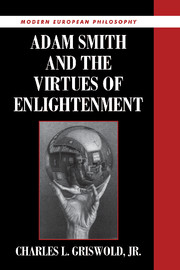Book contents
- Frontmatter
- Contents
- Texts and Acknowledgments
- Introduction
- 1 Rhetoric, Method, and System in The Theory of Moral Sentiments
- 2 Sympathy and Selfishness, Imagination and Self
- 3 The Passions, Pleasure, and the Impartial Spectator
- 4 Philosophy and Skepticism
- 5 The Theory of Virtue
- 6 Justice
- 7 The Moral Sentiments and The Wealth of Nations
- 8 Philosophy, Imagination, and the Fragility of Beauty: On Reconciliation with Nature
- Epilogue
- Bibliography
- Index
6 - Justice
Published online by Cambridge University Press: 10 November 2009
- Frontmatter
- Contents
- Texts and Acknowledgments
- Introduction
- 1 Rhetoric, Method, and System in The Theory of Moral Sentiments
- 2 Sympathy and Selfishness, Imagination and Self
- 3 The Passions, Pleasure, and the Impartial Spectator
- 4 Philosophy and Skepticism
- 5 The Theory of Virtue
- 6 Justice
- 7 The Moral Sentiments and The Wealth of Nations
- 8 Philosophy, Imagination, and the Fragility of Beauty: On Reconciliation with Nature
- Epilogue
- Bibliography
- Index
Summary
Clearly, no one has a higher claim on our reverence than the man who possesses the instinct and the strength for justice. … In fact, the will to be just is not enough; and man's worst miseries are the result of justice that lacks discernment. This is why the general welfare demands above all else that the seeds of judgment be sown as widely as possible so as to distinguish between fanatic and judge, and to recognize the difference between the blind desire to be judge and the ability to judge. But how can we possibly develop such discernment?
Friedrich NietzscheJustice differs from the other virtues in a number of respects. It seems preeminently a social or political virtue, bearing on the relations required for the very existence of community in a way that other virtues do not. Unlike the other virtues, justice may rightly be exacted from us by force. The principles or rules that define justice are ordinarily taken as enforceable whereas the rules of benevolence are not. The rules specifying what actions justice requires or prohibits are more precise than those of the other virtues; as we have seen, Smith compares them to the rules of grammar. Further, justice is distinct in that it is primarily a “negiative virtue” (II.ii.1.9), defined in terms of abstention from wrongdoing. Whereas Smith insists on the distinctness of justice, he also holds that justice is a virtue or excellence of character, though not an admirable disposition of self in quite the same sense as the other virtues.
- Type
- Chapter
- Information
- Adam Smith and the Virtues of Enlightenment , pp. 228 - 258Publisher: Cambridge University PressPrint publication year: 1998



